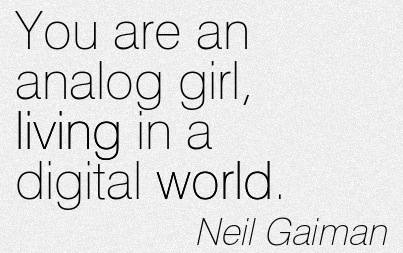Two weeks ago, I quit. Cold turkey.
I am not a smoker or a drinker. I don’t use drugs and will cut myself off from caffeine if I feel myself becoming too dependent on it. That’s the point really: I don’t do addiction because I don’t like losing control. But if 2014 has taught me anything, it is that nothing is ever under control for long, and that addiction can sneak up on you when you least expect it.
I was a child of a slower life. Through my late adolescence, my world was one of paper and ink. The Internet didn’t really take hold until the late ‘90’s, and by that time, my relatively analog habits were set. I am a slower technological adopter. I refused to get a Facebook account until 2007, resisted Twitter til 2012, and didn’t swap my Blackberry for an iPhone until late in the game. But I get there eventually, tinkering with new tech til I find its optimal worth. This mixture of worlds allows me to bridge the divide between analog and digital fairly seamlessly: I prefer physical books but will occasionally dabble in eBooks, I write out my blog posts in a journal before typing them up to publish, and I meet friends nearby for coffee or dinner while keeping in touch with those at a geographical distance through Facebook and email. This system worked for a long while, allowing me to take only the positive benefits from either sphere.
The relatively nascent field of “cyberpsychology” lays out both the good and the bad of an increasingly connected world. Recent research shows that happiness and positivity on social media can have a ripple effect when shared. Since emotion is even more contagious online than it is offline, the value of a positive person holds greater weight in the digital world.
Yet there is also a dark side to the Internet Age. Researchers have noticed that online interaction leads to increased dopamine levels in shorter bursts, the kind one gets through gambling or drug and alcohol addiction. This quick, temporary high leads to addictive behaviors that are pleasurable in the short term, but can lead to depression if the person addicted does not continue sustaining the feeling.
The balance I’d long believed in tilted ever so slightly this year. 2014 has been a year of upheaval, and while I’ve long appreciated change for the growth it provides, being in the midst of uncertainty is a jarring experience. The less control I had over my real life, the more I veered from my regular social media habits to more self-centered ones. These new habits left me far less satisfied and far more restless than before.
So I quit. For ten days, I deactivated from Facebook and recalibrated to a slower life. To reprogram parts of my brain that had fallen into disuse, I went back to old habits: reading books instead of skimming articles open in multiple tabs across my web browser, regaining the ability to focus on the words. I taught myself how to knit. I’ve sorted through friends I’d most like to stay in touch with and have started writing them old-fashioned letters, with the unexpected side effect of observing the world around me more keenly in order to have something tangible to write about.
The most surprising revelation is how frighteningly quickly the brain rewires to new circumstances, and how soon we forget how to do the things we’d long taken for granted. For the last six months, my online life has caused attention deficits, messed with my sleep cycle, and has led to unsatisfying connections with others. Prior to my addiction, the digital world provided a space to connect, to exchange ideas, to create space for new friendships or new acquaintanceships to grow, and helped build tribes for positive, meaningful work. I had veered from my original schematic drastically, and the detox has helped me re-center: my connections to others are better for being qualitative, not quantitative, I feel less jittery, less restless, and my focus allows me to be calmer than I have been for months. But quitting Facebook also left me feeling somewhat bereft, disconnected from the world, from news and opinions, from remembering friends’ birthdays, from participating in events.
I am more mindful upon my return – perhaps that is the key to fighting addiction and retaining a sense of self in the social media age. Mindfulness, coupled with a healthy balance between the analog and the digital, is what will get us through the advancements of the future.
(Photo Source: Meetville.com)
Zainab Chaudary works in politics by day and is a writer by night. Her blog, The Memorist, ruminates upon travel, religion, science, relationships, and the past, present, and future experiences that make up a life. She tweets at @TheMemorist. As “The Geekologist,” Zainab also writes a monthly column for the blog “Love, Inshallah.”



